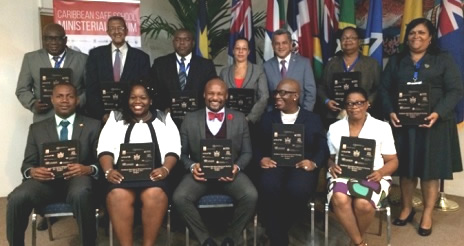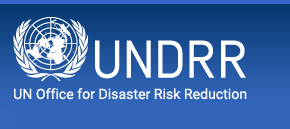- Our Mandate
- Mission and Objectives
- UNDRR in the UN
- Work Programme & Annual Reports
- Results Based System
- Work Partnerships
- Headquarters - Geneva
- SG-UN representatives for DRR
- Regional Office – The Americas and the Caribbean
- Head of the Regional Office – The Americas and the Caribbean
- What is Disaster Risk Reduction?
- What is the International Strategy?
- History of UNDRR
Caribbean Safe School Ministerial Forum: Committing to school safety at national and regional levels

Caribbean Safe School Ministerial Forum Photo Cred: Ministry of Education, Science and Technology of Antigua & Barbuda
By UNDRR The Americas
PANAMA CITY, Panama 5 April 2017 – Ministers and other high-level authorities from the Education sector endorsed the Antigua and Barbuda Declaration for School Safety during the Caribbean Safe School Ministerial Forum which took place from 3 to 4 April 2017 and was hosted by Antigua and Barbuda's Ministry of Education, Science and Technology. Hon. Michael S. Browne, Minister of Education, Science & Technology, Antigua and Barbuda, highlighted that “In the Caribbean, there is the need to have clarity on how everyone, individuals, nations and the region will respond to disasters, for which there is the need to work as a team”.
During the meeting the Caribbean Safe School Initiative (CSSI) was launched. The CSSI is the framework to advance school safety in the Caribbean and at the same time reflects the Caribbean contribution to the Worldwide Initiative for Safe Schools (WISS). With regard to enhancing school safety, Ms. Elizabeth Riley, Deputy Director of the Caribbean Disaster Emergency Management Agency (CDEMA), informed participants that “the Caribbean Safe School Initiative will be the flagship programme for CDEMA for 2017-2020.”
In keeping with that which is stipulated at the global level, the CSSI will be a Caribbean partnership for advancing safe school implementation at the national level. Ministries of Education will lead the implementation supported by international, regional and national partners.
Ministers and high-level representatives demonstrated political commitment by endorsing and signing the Antigua and Barbuda Declaration on School Safety. In addition, based on national needs, regional priorities for school safety were identified for each of the three pillars of the Comprehensive Safe School Framework: Safe Learning Facilities (disaster-resilient infrastructure), School Disaster Management, and Disaster Risk Reduction and Resilience Education, which are reflected in the Caribbean Road Map for School Safety. The Road Map will guide the implementation of the CSSI at the regional and national level.
By committing to the Caribbean Safe School Initiative, Ministries of Education from the Caribbean are demonstrating their commitment to contribute to the implementation of the Caribbean Disaster Management Strategy, the Sendai Framework for Disaster Risk Reduction and the Sustainable Development Goals.
Disasters have a major impact on children, youth and education systems. Studies suggest that each year, 175 million children worldwide are likely to be affected by disasters, and children in the Caribbean are no exception. In 2004, Hurricane Ivan led to widespread destruction in Grenada, damaging 73 of 75 public schools. In 2010, an earthquake in Haiti resulted in the deaths of 38,000 students and 1,300 teachers and education personnel, with 4,000 schools destroyed as well as the headquarters of the Ministry of Education, and severe disruptions to the education process in general. Capacities to anticipate, prepare, adapt and become more resilient are necessary to ensure that these figures do not continue to increase in the future together; together with policies, plans and mechanisms to reduce the negative social, economic and environmental impacts of such events while strengthening the overall wellbeing and development of the region and its Member States.
The WISS was developed in collaboration with partners from the Global Alliance on Disaster Risk Reduction Education and Resilience in the Education Sector (GADRRRES) and approved during the Third World Conference on Disaster Risk Reduction in 2015.
The Caribbean Safe School Ministerial Forum was jointly organized by the Caribbean Disaster Emergency Management Agency (CDEMA), the United Nations Children’s Fund (UNICEF), the United Nations Office for Disaster Risk Reduction (UNDRR), the United Nations Educational, Scientific and Cultural Organization (UNESCO), the Organization of Eastern Caribbean States (OECS) and the International Federation of Red Cross and Red Crescent Societies (IFRC and was made possible thanks to the financial support of the Austrian Development Agency, the Kingdom of the Netherlands and the Republic of Korea.
Related links:
Antigua and Barbuda Declaration for School Safety
The Caribbean Safe School Ministerial Forum
Worldwide Initiative for Safe Schools (WISS)
Priority areas of the Caribbean Road Map on School Safety
Enabling environment
Pillar 1: Safe Learning Facilities
Pillar 2: School disaster management
Pillar 3: Risk Reduction and Resilience Education
|
Follow the UNDRR news online:
 Now we have twitter account @UNDRR Américas y el Caribe
Now we have twitter account @UNDRR Américas y el Caribe
JOIN US!
Tweets por el @UNDRR Américas y el Caribe
